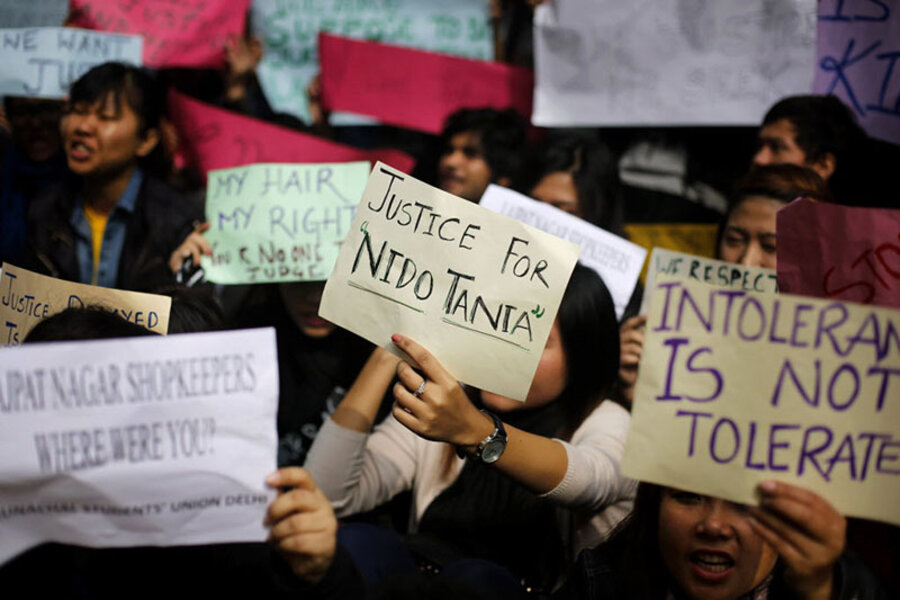India may criminalize name-calling: Free speech or hate speech?
When does shouting at a minority cross the line from free speech to hate speech?
That's the question facing Indian legislators, who are considering making racial slurs against a minority group from northeastern India a criminal offense.
On Wednesday, the Ministry of Home Affairs decided to amend the Indian Penal Code to make this type of racism punishable by up to five years in jail, NDTV.com reported.
The action was spurred by a series of attacks against northeastern Indians last year.
After an alleged hate crime in 2014, which led to the death of 20-year-old Nido Taniam in Delhi, the Bezbaruah Committee was created to investigate grievances faced by citizens from northeast India.
They found 86 percent of Indians from the northeast said they faced racial discrimination in Indian cities – commonly in the form of lewd comments, often directed towards their "mongoloid features," and sexual harassment.
The committee acknowledged existing legal provisions that prohibit "discrimination on grounds of religion, race, caste, sex or place of birth," but found that the northeast population tend to fall between the cracks, and thus have no legal recourse in the face of hate crimes and racial violence.
In October 2014, a northeastern engineering student was told, "You are eating Karnataka food, living in Karnataka, you have to speak in Kannada. If you can’t, get lost," and was then violently beaten by three men. The local police commissioner dismissed it as "a drunken brawl, not a racially motivated incident," reported the Wall Street Journal.
The proposed amendment would punish violence, prejudicial speech, written text, and gestures against a particular race with a non-bailable sentence and imprisonment for up to five years with a fine, according to NDTV.
Sanjay Jain, a deputy solicitor general, said the measure would be accompanied by legal aid programs, special police initiatives, and public education.
These developments came less than four months after the Indian Supreme Court overturned a law banning offensive messages online, according to The Wall Street Journal.
The court ruled that the law, which criminalized sharing information that could cause “annoyance, inconvenience […] or hatred” via computers and phones, violated constitutional guarantees of free expression. In 2012, this law was used to arrest a woman who clicked "Like" on a political Facebook post.
Critics say the new law would not address the underlying problem.
India’s Representation of People’s Act forbids politicians from promoting hatred on racial and religious lines. But Colin Gonsalves, an Indian lawyer, told Al Jazeera this did not keep politicians from making hateful speeches.
In India, the right to free speech is subject to "reasonable restrictions" in the interests of state sovereignty, state security, public order, and "decency or morality."
The US, too, wrestles with the line between punishing hate crimes and protecting free speech.
Nations lack consensus on what constitutes hate speech, reports the Minority Rights Group International. The term can sometimes lack a focus on national, religious, or ethnic groups, which raises concerns for freedom of expression.
In his book "Bloody Words: Hate and Free Speech," Canadian human rights attorney David Matas writes, "...if anti-hate laws are vague, we should not have them. Vagueness would vitiate the laws, render them useless, and indeed threaten free speech unduly."





